|
|
|
Sort Order |
|
|
|
Items / Page
|
|
|
|
|
|
|
| Srl | Item |
| 1 |
ID:
141654


|
|
|
|
|
| Summary/Abstract |
“Soft balancing” has emerged as a way to reconcile realist theory with the lack of hard balancing behavior against US hegemony. Scholars continue, however, to disagree on the concept's utility and causes. Consistent with its realist roots, scholars have primarily focused on power imbalance and external threat to security as causes of soft balancing. This article analyzes Moldova's major foreign policy shift in the mid-2000s. It argues that this was a clear example of soft balancing and that it adds several important insights into the causes of soft balancing. While the power imbalance and external threat from Russia were persistent throughout Moldova's post-independence history, the country only adopted a soft balancing strategy once Russia posed a threat to the internal stability of the government and changes in EU policy created a permissive international environment for the strategy. Moreover, we argue that the domestic political environment played a key role in enabling the adoption of this strategy. This article therefore diversifies the analysis of the causes of soft balancing and provides a theoretical answer for the puzzle of Moldova's pro-Western turn in 2003.
|
|
|
|
|
|
|
|
|
|
|
|
|
|
|
|
| 2 |
ID:
175017
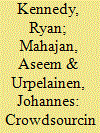

|
|
|
|
|
| Summary/Abstract |
Measuring energy access in developing countries involves much more than simply recording whether or not households are connected to the grid. Both international organizations and scholars now recognize the importance of reliable electricity supply for achieving positive development outcomes. Yet, measuring reliability is much more difficult than measuring the existence of connections. We propose an economical croudsourcing method for measuring reliability, and compare this method to energy monitor data for 122 households over 12 months. The results suggest that, while far from perfect, crowdsourcing provides a reasonably accurate method for monitoring the reliability of access over time, especially when modeled as a non-linear relationship. We apply these findings to model energy reliability in a broader group of villages across Uttar Pradesh, India, demonstrating the existence of disparities between urban and rural reliability and seasonal fluctuations in reliability. The system laid out in this study can be utilized by government and non-government organizations to quickly and cheaply monitor energy reliability.
|
|
|
|
|
|
|
|
|
|
|
|
|
|
|
|
| 3 |
ID:
126565
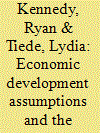

|
|
|
|
|
| Publication |
2013.
|
| Summary/Abstract |
Scholars have argued that oil resources lead to poor quality institutions and governance, which causes slower economic growth, an increased propensity for civil war, and other maladies. Such conclusions, however, rest on strong modernization assumptions that oil resources are unrelated or detrimental to the level of economic development. Utilizing a unique multilevel version of extreme bounds analysis (EBA), we find that oil's deleterious effects on governance are not well established. Instead, when we relax strong assumptions about the exogeneity of economic development and utilize more objective indicators of institutional quality, oil has a net positive impact on governance. Moreover, when accounting for endogeneity, there is little to suggest either an intervening or independent effect of poor governance on civil conflict in petro-states.
|
|
|
|
|
|
|
|
|
|
|
|
|
|
|
|
| 4 |
ID:
076699
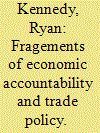

|
|
|
| 5 |
ID:
144778
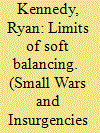

|
|
|
|
|
| Summary/Abstract |
Both the EU and NATO have greatly expanded efforts to address the frozen conflict in Transnistria since 2003. These efforts by and large fall neatly into the category of ‘soft balancing’ actions against Russian influence in the conflict and in Moldova more generally. Given that soft balancing is normally seen as a strategy undertaken by relatively weak actors vis-à-vis a global or regional hegemon, this behavior is puzzling. The actions of these institutions demonstrate that soft balancing is a logical strategy for stronger actors when the conflict is not as salient as for the weaker actor. The EU and NATO’s desire to resolve the conflict is not salient enough to warrant a costlier hard power strategy. Recent developments in Ukraine also demonstrate the limitations of this strategy. Specifically, the application of this soft power has done little to change the incentives for separatist leaders or their Russian backers, meaning they have little ability to resolve the conflict. They have also fallen short of creating a permanent pro-Western consensus in Moldova. They do, however, augment Moldova’s ability to adapt to the challenges posed by the conflict and provide a paper wall against more aggressive Russian ambitions in the region.
|
|
|
|
|
|
|
|
|
|
|
|
|
|
|
|
| 6 |
ID:
141232
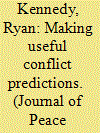

|
|
|
|
|
| Summary/Abstract |
One of the major issues in predicting state failure is the relatively rare occurrence of event onset. This class skew problem can cause difficulties in both estimating a model and selecting a decision boundary. Since the publication of King & Zeng’s studies in 2001, scholars have utilized case-control methods to address this issue. This article builds on the landmark research of the Political Instability Task Force comparing the case-control approach to several other methods from the machine learning field and some original to this study. Case-control methods have several practical disadvantages and show no measurable advantages in prediction. The article also introduces cost-sensitive methods for determining a decision boundary. This explication raises questions about the Task Force’s formulation of a decision boundary and suggests methods for making useful predictions for policy. I find that the decision boundary chosen by the PITF implicitly assumes that the cost of intervention is about 7.7% of the cost of non-intervention when state failure will take place. These findings demonstrate that there is still much work to be done in predicting state failure, especially in limiting the number of false positives. More generally, it suggests caution in using accuracy as a measure of success when significant class imbalance exists in the data.
|
|
|
|
|
|
|
|
|
|
|
|
|
|
|
|
| 7 |
ID:
171400


|
|
|
|
|
| Summary/Abstract |
Universal household electrification is a key component of the United Nations Sustainable Development Goals, but the evidence base for social and economic impacts of electricity access remains unclear. Here we report results from a systematic review of impact evaluations of household electrification based on five key outcome measures. We only find 31 studies that conduct statistical hypothesis tests to assess impacts. Among these, seven draw on a randomized experiment designed for causal inference. The randomized experimental studies generate fewer positive results than observational or quasi-experimental studies, such as correlational, instrumental variable, and difference-in-differences designs. These results call for a reassessment of what we know about the impacts of household electrification. They also call for major investment in impact evaluation of electricity access using randomized controlled trials, with a particular focus on when and how energy access interventions can furnish large benefits to their intended beneficiaries. Large-scale impact evaluations using experimental methods will require close collaboration between policymakers and researchers.
|
|
|
|
|
|
|
|
|
|
|
|
|
|
|
|
| 8 |
ID:
166489
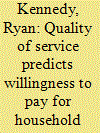

|
|
|
|
|
| Summary/Abstract |
While rural electrification has been a high priority for many governments in the developing world, the factors that make individual households more likely to pay for a connection have received insufficient attention. In particular, many studies have dealt with the role of affordability of grid connections, but they have generally avoided studying the effects of service quality. Estimating the effect of quality on willingness of potential customers to pay is a difficult task because of self-selection – if quality is important, those in higher quality service areas are more likely to have a connection. Using household data from rural India, we estimate a Heckman selection model to deal with this issue and find a substantial impact of quality on willingness to pay for a connection in India. The results suggest that improving the quality of connections is critical to improving access.
|
|
|
|
|
|
|
|
|
|
|
|
|
|
|
|
| 9 |
ID:
091028
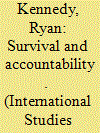

|
|
|
|
|
| Publication |
2009.
|
| Summary/Abstract |
This study re-examines the empirical support for one of the most influential explanations of leadership tenure, "selectorate theory," by testing for consistency across key regime categories. The argument made herein is that if the measures are good, the consistency of their relationships should not be limited to particular nominal regime categories, and they should capture the implications of the theory differentiating it from competing theories. Current measures of selectorate theory concepts are wanting on both fronts. I find that the measure used for winning coalition size is correlated with the destabilization of leaders in democracies and the stabilization of leaders in nondemocracies. I also find that the measure of selectorate size exhibits two behaviors inconsistent with the theory: larger selectorates are only stabilizing after the leader has already been in office for an extended period of time; and the effect is only substantial for differentiating between types of military regimes. These findings have five implications: (1) they cast serious doubt on the utility of current measures of selectorate theory; (2) they raise conceptual questions about the treatment of political regimes as vectors or categories; (3) they define substantive, not just statistical, issues that future measures will need to address; (4) they give baselines for re-analysis of the effect of these measures on other implications of interest; and (5) they provide an interesting comment on the comparative politics literature on hybrid regimes and the effect of parliamentary institutions in nondemocratic regimes.
|
|
|
|
|
|
|
|
|
|
|
|
|
|
|
|
| 10 |
ID:
120978


|
|
|
|
|
| Publication |
2013.
|
| Summary/Abstract |
Since the election of the Justice and Development Party (AKP) in 2002, Turkey has become the subject of increased attention from the US foreign policy community. Schools of thought range from those who argue that Turkey is "turning away from the West" to those who suggest that Turkey is pursuing a more autonomous foreign policy. One of the few things on which these schools of thought agree is that, if they are correct, we should be able to find these patterns in public opinion. Analyzing data from the Pew Global Attitudes Project, we find some differences in attitudes based on political party affiliation, income and education, but the results generally refute the argument that Turks see a fundamental choice between East and West in their foreign policy or that supporters of the AKP have fundamentally different international outlooks. Taken together, these results have important implications for US policymakers.
|
|
|
|
|
|
|
|
|
|
|
|
|
|
|
|
|
|
|
|
|